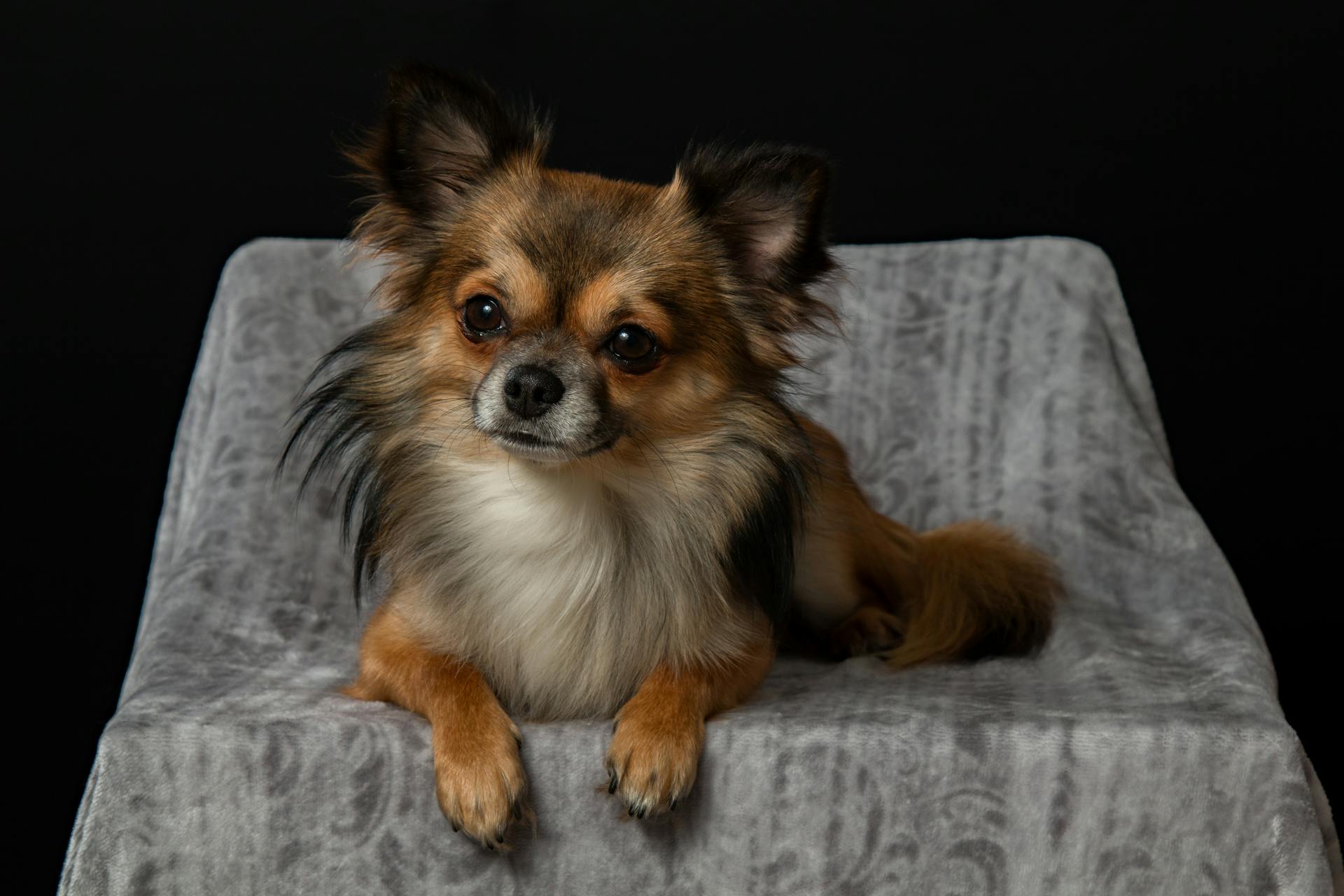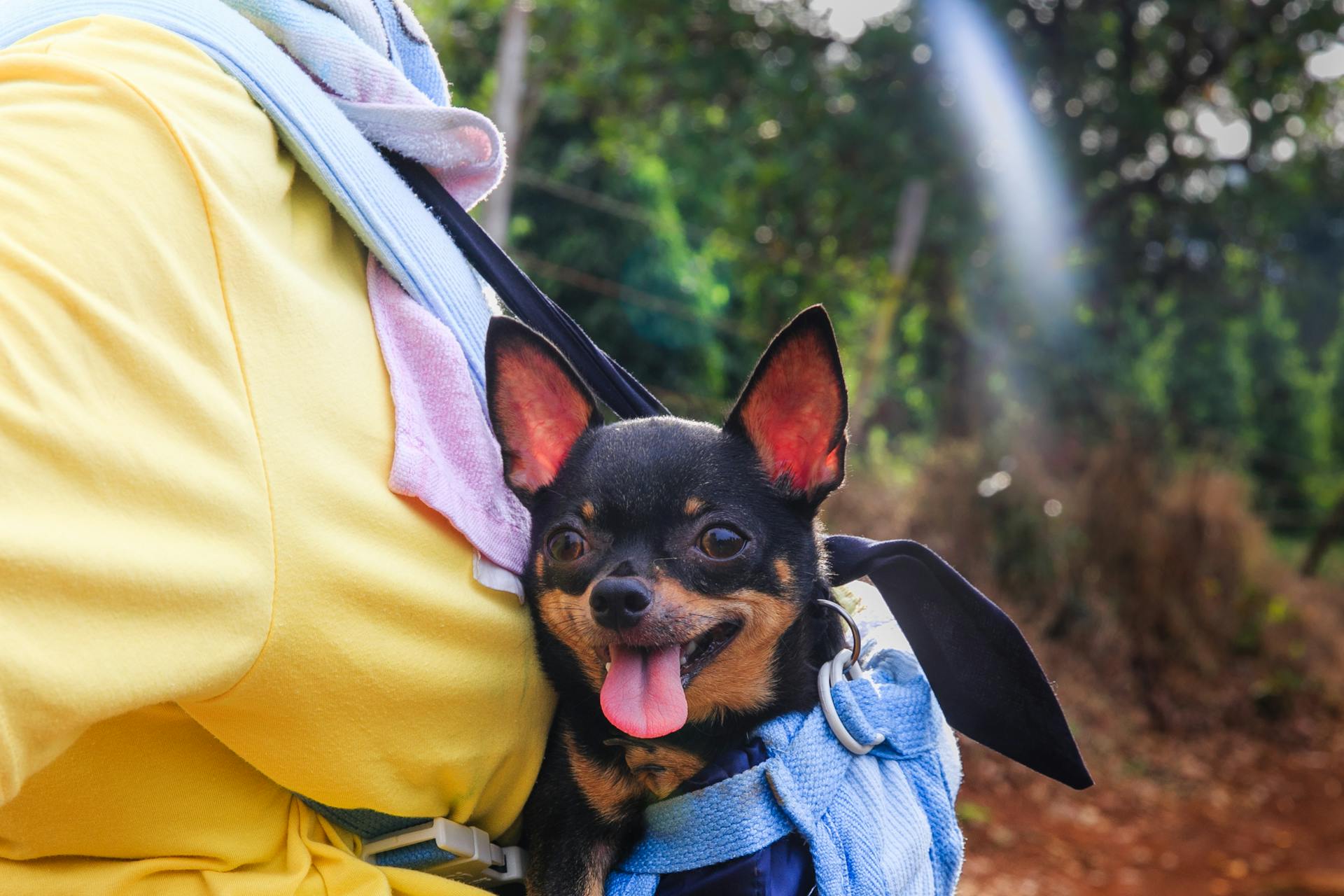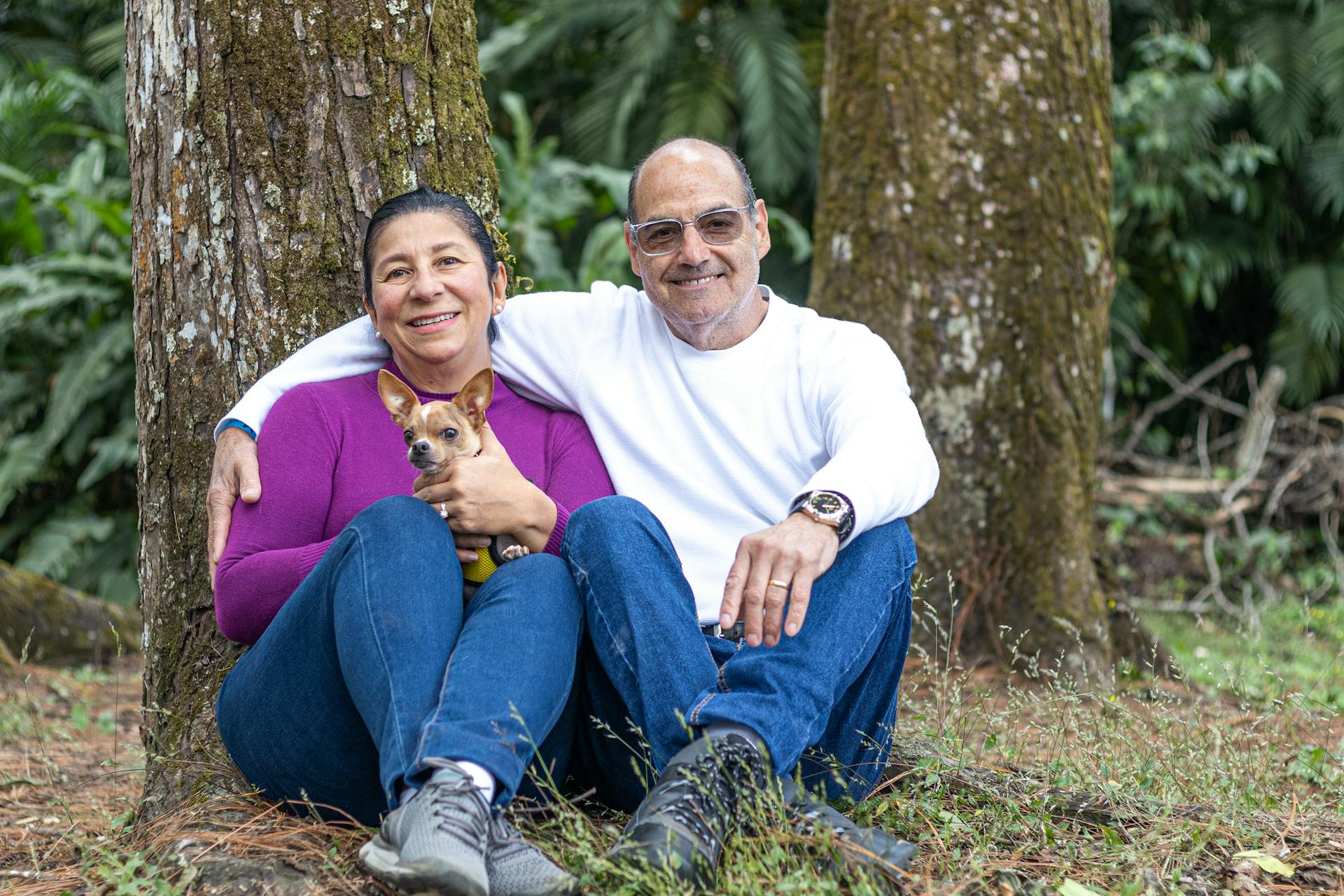
Chihuahuas can be territorial, especially in their own homes. They have a strong instinct to defend their family and territory from perceived threats.
Some Chihuahuas may exhibit aggression towards strangers or other pets due to their territorial nature. According to research, Chihuahuas are more likely to bite when they feel their family is being threatened.
To manage aggression in Chihuahuas, it's essential to socialize them well from an early age. Socialization helps Chihuahuas become confident and calm in the presence of new people, animals, and environments.
However, some Chihuahuas may still exhibit territorial behavior, especially if they're not properly trained or exercised. Regular exercise and mental stimulation can help reduce aggression in Chihuahuas.
Worth a look: Are German Shepherds Territorial
Understanding Chihuahua Behavior
Chihuahuas are known to be fiercely loyal to their owners and may exhibit protective behavior, especially in unfamiliar or threatening situations.
Their boldness, loyalty, and strong-willed nature can sometimes be misconstrued as aggression, but it's essential to recognize that this is not a breed-specific trait.
Chihuahuas are intelligent and can be quite cunning when it comes to getting their way, which can sometimes manifest as nervousness or even fear aggression in certain situations.
Small Dog Syndrome, a behavioral condition, is common among small dog breeds, including Chihuahuas, and is often a result of improper or lack of basic obedience training, house training, and boundary control.
Reactive barking, resource guarding, and leash pulling are symptoms of Small Dog Syndrome, which can be caused by fear rather than protection.
Proper training, socialization, and boundary control can prevent aggression and fear-based behaviors in Chihuahuas.
Puppies, especially, go through two fear periods: one from 4 to 12 weeks and the other at 7 or 8 months of age, which can help "hard wire" their minds to react to situations that would normally cause fear.
Creating safe and planned socialization experiences can help most puppies learn in just 5 minutes, providing positive reinforcement through play or treats.
For your interest: Why Are Chihuahuas so Small
Signs of Aggression
Signs of Aggression in Chihuahuas are often subtle, but can be incredibly telling. Chihuahuas may exhibit fear aggression due to past traumatic experiences or inadequate socialization.
Growling, snarling, and baring teeth are common signs of aggression in Chihuahuas, typically occurring when they feel threatened or stressed. Lunging and biting are also warning signs that a Chihuahua may be exhibiting aggression.
Chihuahuas may also display body language cues such as raised hackles, stiff posture, and a tense facial expression, indicating heightened aggression. Resource guarding can also be a sign of aggression, where a Chihuahua becomes protective of their food, toys, or other possessions.
Here are some specific signs of aggression in Chihuahuas:
- Growling, snarling, and baring teeth
- Lunging and biting
- Raised hackles, stiff posture, and a tense facial expression
- Resource guarding (growling, stiffening, and snapping when approached while in possession of an item)
These signs can be indicators of underlying aggression issues, such as fear aggression, resource guarding, or territorial aggression. By recognizing these warning signals, owners can take proactive steps to address and manage their Chihuahua's behavior effectively.
Preventing and Managing Aggression
Preventing and managing aggression in Chihuahuas requires a deep understanding of their behavior and temperament. Chihuahuas can exhibit aggression due to fear, resource guarding, territorial instincts, or redirected aggression.
Socialization is key to preventing aggression in Chihuahuas. Puppies go through two fear periods, one from 4 to 12 weeks and the other at 7 or 8 months of age. Creating safe and planned socialization experiences can help hardwire their minds to react positively in situations that would normally cause fear.
Small Dog Syndrome is a common issue among Chihuahuas, causing reactive barking, resource guarding, leash pulling, and other bad behaviors. This is often a result of improper or lack of basic obedience training, house training, and boundary control.
To prevent aggression, owners can teach their Chihuahuas to follow commands and respect boundaries through socialization, basic obedience training, and boundary control. Positive reinforcement and treat rewards work better than scolding and punishments.
Here are some signs of aggression in Chihuahuas to look out for:
- Growling, snarling, and baring teeth
- Lunging and biting
- Raised hackles, stiff posture, and a tense facial expression
- Resource guarding, such as stiffening, growling, and snapping when approached while in possession of an item
By understanding the root causes of aggression in Chihuahuas, owners can take proactive steps to address and manage their dog's behavior effectively. This may involve training, socialization, and providing a safe and stable environment.
With consistent training and management, Chihuahuas can learn to coexist peacefully with their owners and other pets. By recognizing the signs of aggression and taking steps to prevent it, owners can enjoy a happy and harmonious relationship with their furry friends.
Discover more: Are Chihuahuas Good for First Time Owners
Training and Management
Chihuahuas can be stubborn and sassy, making training a challenge. Positive reinforcement and treat rewards work better than scolding and punishments.
Consistent obedience training can help minimize outbursts of aggression in Chihuahuas. Socialization and training play a major factor in a Chihuahua's personality.
Management of the environment is key to preventing aggression in Chihuahuas. Managing interactions between multiple Chihuahuas can prevent conflicts.
It's essential to recognize that aggression in Chihuahuas is not a breed-specific trait but rather a result of various factors, including genetics, socialization, and environment.
By creating safe and planned socialization experiences, most puppies can learn to manage their fear in just 5 minutes. This includes learning about other floor types, objects, and loud noises.
Teaching your Chihuahua to follow your command and respect your requests can be achieved through socialization, basic obedience, and boundary control. This helps them learn to do things because they want to, not out of fear or domination.
Managing interactions between Chihuahuas and providing them with separate spaces can help prevent resource guarding and aggression. Giving each dog attention and affection separately can help prevent conflicts.
Providing positive reinforcement, such as treats and play, can help teach your Chihuahua to behave calmly in the presence of other dogs and people.
Resource Guarding and Aggression
Resource guarding is a common behavior in Chihuahuas, where they feel the need to defend their valuable resources, which can include food, toys, and even their owners.
Chihuahuas view their owners as a resource, a protector, and a source of love and affection.
Resource guarding can stem from insecurity or a lack of trust, and it's essential to address this behavior immediately.
Some common signs of resource guarding include stiffening, growling, and snapping when approached while in possession of an item.
Chihuahuas may also exhibit aggression when guarding their food, toys, or other possessions.
Here are some types of aggression related to resource guarding:
- Fear Aggression: Chihuahuas may exhibit aggression when they feel threatened or fearful.
- Resource Guarding: Some Chihuahuas may become aggressive when they feel their possessions are being threatened or taken away.
To address resource guarding, management and training are key. Manage the situation by separating your Chihuahua from the resource, and then train them in a controlled environment to show them that good things happen when they "share" their resources.
It's essential to recognize the signs of aggression and intervene promptly to prevent injuries to people or other pets.
Chihuahuas can also "defend" their territory, which isn't always just their yard or surroundings, but can include their owners and other valuable resources.
By understanding the root causes of aggression in Chihuahuas, owners can take proactive steps to address and manage their dog's behavior effectively.
Chihuahuas may also exhibit other types of aggression, including territorial aggression, redirected aggression, and predatory aggression.
Understanding these types of aggression is crucial for effectively addressing and managing your Chihuahua's behavior.
It's never too late to address aggression in Chihuahuas, and with the right training and socialization, you can help your dog become a well-behaved and loving companion.
Explore further: How Many Breeds of Chihuahuas Are There
Dealing with Aggression Issues
Chihuahuas can exhibit aggression due to various factors, including Small Dog Syndrome, which is often caused by a lack of basic obedience training and boundary control.
Small Dog Syndrome can manifest in different ways, including reactive barking, resource guarding, and leash pulling.
Reactive barking is a common symptom of Small Dog Syndrome, often triggered by fear or anxiety, such as the sound of a knock on the door or a stranger approaching.
Resource guarding is another sign of Small Dog Syndrome, where a Chihuahua becomes aggressive when trying to protect their food, toys, or other possessions.
To address aggression in Chihuahuas, it's essential to understand the root causes, which can include fear aggression, resource guarding, territorial aggression, redirected aggression, and predatory aggression.
Fear aggression can be a result of past traumatic experiences or inadequate socialization, while resource guarding can stem from insecurity or a lack of trust.
Territorial aggression, on the other hand, can be mitigated with proper training and socialization.
Aggression in Chihuahuas can manifest in different forms, making it crucial to recognize the signs, which include growling, snarling, and baring teeth, lunging and biting, and body language cues such as raised hackles and stiff posture.
To train a Chihuahua not to be aggressive, socialization and training are key, along with positive reinforcement and treat rewards.
Here are some common signs of aggression in Chihuahuas:
- Growling, snarling, and baring teeth
- Lunging and biting
- Body language cues such as raised hackles and stiff posture
- Resource guarding
By understanding the causes of aggression in Chihuahuas and recognizing the signs, you can take proactive steps to address and manage your dog's behavior effectively.
Featured Images: pexels.com


